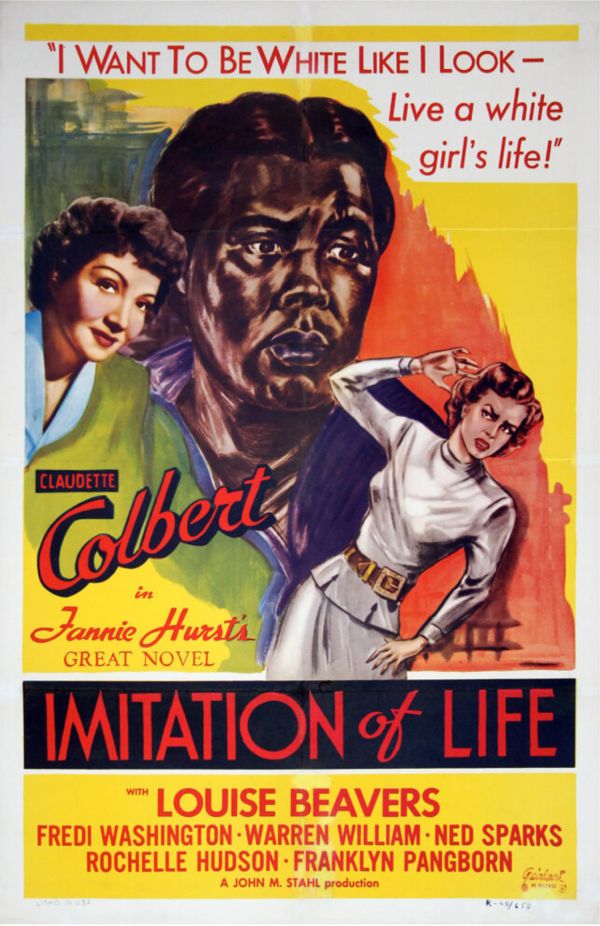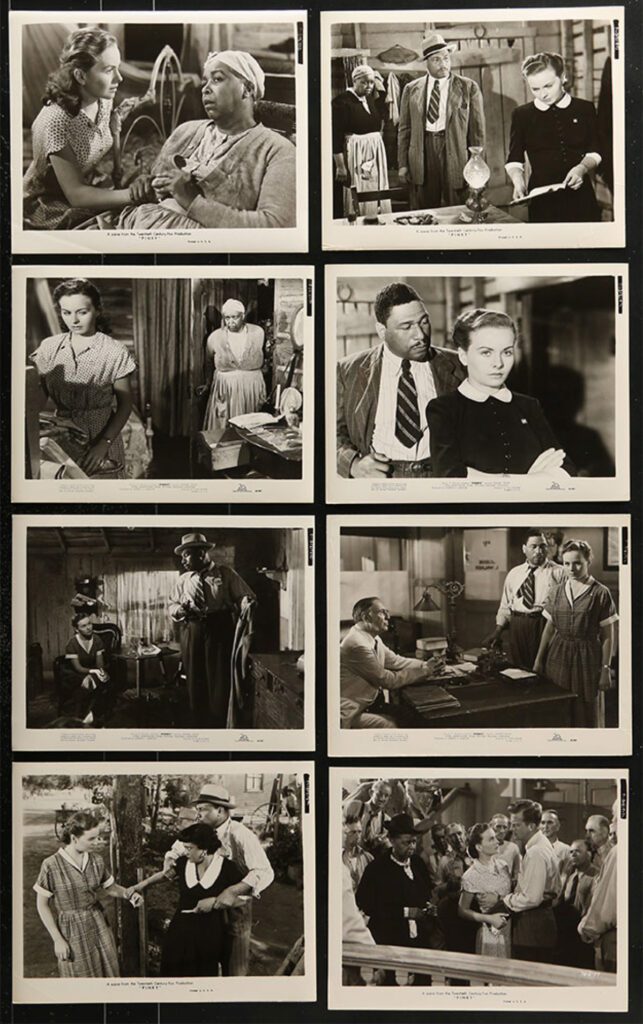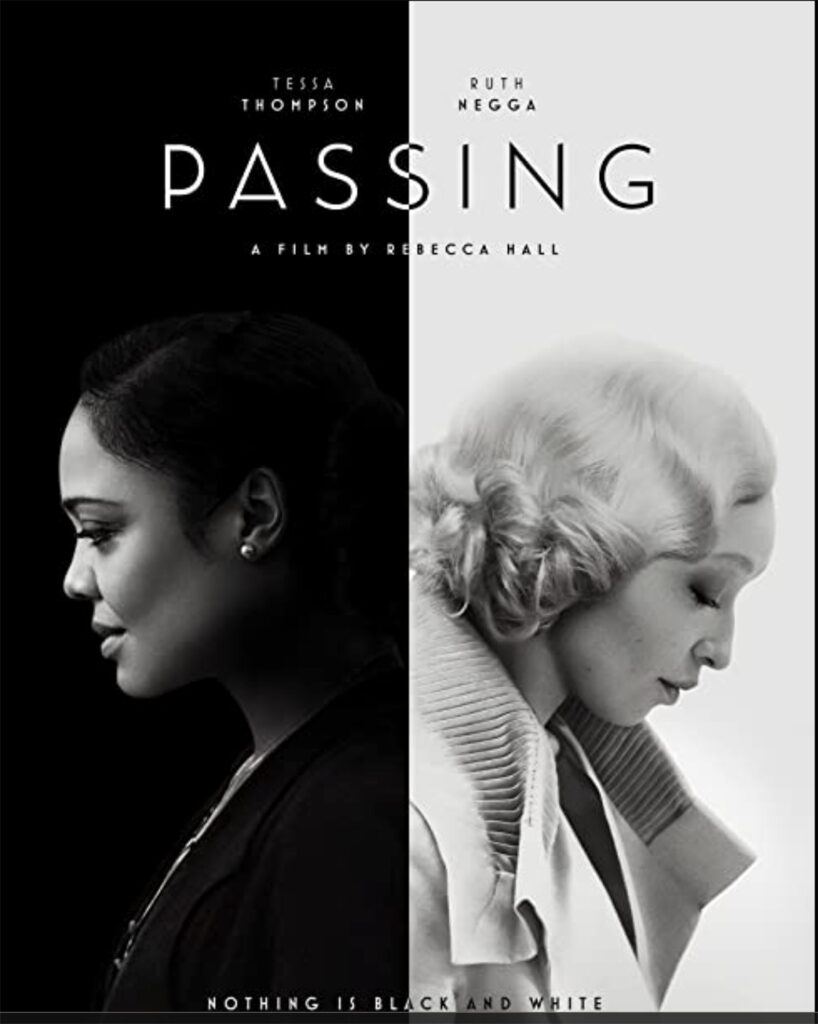
“Passing” Reflected in Three Films
The Netflex film Passing deals with the African American topic that has come to be known as “Passing” when a person classified as a member of a racial group is accepted or perceived (“passes”) as a member of another. Historically, the term has been used primarily in the United States to describe a person of color or of multiracial ancestry who assimilated into the white majority to escape the legal and social conventions of racial segregation and discrimination.”
These three films, Imitation of Life (1934), Pinky (1949) and Passing (2021) each deal with a Black woman, who, because of her light skin, passes for white and the ramifications that occur when that reality becomes a significant factor in her life.
IMITATION OF LIFE
The above poster: Np: Realart Pictures, 1949. Vintage original 41 x 27″ (104 x 69 cm.) one sheet poster. Conserved on linen, with minor touch ups at old fold lines, near fine.
The first of these film was a landmark film of the 1930s. Directed by John M. Stahl with a screenplay by William Hurlbut and eight additional writers, is based on Fannie Hurst’s 1933 novel of the same name. The film stared Claudette Colbert, Louise Beavers, Warren William, Rochelle Hudson, and Fredi Washington. The film was originally released by Universal Pictures and later re-issued in 1936. A 1959 remake with the same title was directed by Douglas Sirk.
Story
Two young women, one black, one white, both widowed with young daughters, come to live together and start a pancake business which eventually makes them wealthy. The young black girl, who is light-skinned, repeatedly tries to disappear into the while world, with tragic consequences.
Reception
This is the only Hollywood film of the 1930s which attempts to deal with the issues of race and racism: “The one film of the Depression to suggest that a contemporary race problem existed in America. It was also an unintentional comment on the exploitation of its African American character Delilah.” (Bogle, Hollywood Black, p. 40)
The themes of the film, to the modern eye, deal with very important issues—passing, the role of skin color in the black community and tensions between its light-skinned and dark-skinned members, the role of black servants in white families, and maternal affection.
Consequence
In 2005, Imitation of Life was selected for preservation in the United States National Film Registry being deemed “culturally, historically, or aesthetically significant”. It was also named by Time in 2007 as one of “The 25 Most Important Films on Race”. The film was nominated for Best Picture, Best Assistant Director and Best Sound Recording, at the 7th Academy Awards.
PINKY

Pinky Is a 1949 American drama film directed by Elia Kazan and produced by Darryl F. Zanuck, from a screenplay by Philip Dunne and Dudley Nichols, based on Cid Ricketts Sumner’s 1946 novel Quality. It stars Jeanne Crain as the title character, a young light-skinned black woman who passes for white. It also stars Ethel Barrymore, Ethel Waters and William Lundigan.
Story
Pinky is a black woman so fair-skinned she was able to pose as white throughout nursing school. Newly graduated, she flees south to visit her grandmother after a doctor, unaware of her true ancestry, proposes to her.
Unsure how to react, she looks to her grandmother, who warns her that only trouble will come of an interracial marriage. Pinky agrees and instead stays to help her grandmother care for an elderly, rich, and fatally ill white woman, who dies and, to the horror of the white community, leaves her stately home and property to Pinky. Rejecting the entreaty of the doctor who proposed to her, she remains in the community and establishes “Miss Em’s Clinic and Nursery School”
Reaction
Pinky was released theatrically in the United States on September 29, 1949 by 20th Century-Fox. It generated considerable controversy due to its subject of race relations and its casting of Crain to play a black woman. It was nonetheless a critical and commercial success, and earned Crain, Barrymore and Waters Academy Award nominations.
PASSING

Passing, the novel, is by American author Nella Larsen, first published in 1929. Set primarily in the Harlem neighborhood of New York City in the 1920s, the story centers on the reunion of two childhood friends—Clare Kendry and Irene Redfield—and their increasing fascination with each other’s lives. The title refers to the practice of “racial passing,” and is a key element of the novel. Clare Kendry’s attempt to pass as white for her husband, John (Jack) Bellew, is a significant depiction in the novel and a catalyst for the tragic events.
Passsing, the film is a 2021 black-and-white drama film written, produced, and directed by Rebecca Hall in her feature directorial debut. … The film stars Tessa Thompson, Ruth Negga, André Holland, Bill Camp, Gbenga Akinnagbe, Antoinette Crowe-Legacy, and Alexander Skarsgård.
The film follows the book’s storyline: Mixed-race childhood friends reunite in middle class adulthood and become increasingly involved in each other’s lives and insecurities. While Irene identifies as African-American and is married to a Black doctor, Clare “passes” as white and has married a prejudiced, wealthy white man. This renewed acquaintance ignites a mutual obsession that threatens both of their carefully constructed realities.
- African American Movie Memorabilia
- African Americana
- Black History
- Celebrating Women’s HistoryI Film
- Celebrity Photographs
- Current Exhibit
- Famous Female Vocalists
- Famous Hollywood Portrait Photographers
- Featured
- Film & Movie Star Photographs
- Film Noir
- Film Scripts
- Hollywood History
- Jazz Singers & Musicians
- LGBTQ Cultural History
- LGBTQ Theater History
- Lobby Cards
- Movie Memorabilia
- Movie Posters
- New York Book Fair
- Pressbooks
- Scene Stills
- Star Power
- Vintage Original Horror Film Photographs
- Vintage Original Movie Scripts & Books
- Vintage Original Publicity Photographs
- Vintage Original Studio Photographs
- WalterFilm
